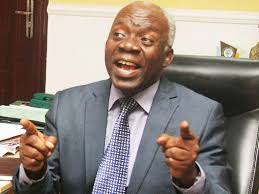
Activist-lawyer Femi Falana (SAN) and a former National Human Rights Commission Chairman Prof. Chidi Odinkalu yesterday identified provisions of the Companies and Allied Matters Act (CAMA) 2020 that grossly violate rights.
They argued that the new law gives too much power to the Registrar General of the Corporate Affairs Commission (CAC), which can be used to clamp down on civil society organisations.
They spoke during a virtual town-hall meeting, with the theme: CAMA 2020: Regulation or Repression?
It was organised by European Union-ACT, Open Society Initiative for West Africa, Working Group on Civil Society Regulatory Environment, the Socio-Economic Rights and Accountability Project (SERAP) and the CAC.
Falana faulted Section 389 of the law that empowers the CAC to suspend the Board of Trustees of an organisation in crisis and appoint an interim committee to manage its affairs.
He also criticised Section 842, which empowers the CAC to take over the funds in the bank accounts of an organisation in crisis, saying the provision amounted to “obtaining money by false pretence”.
The SAN condemned Section 851 of the law, which empowers the CAC to set up an Administrative Proceedings Committee, headed by the Registrar General of CAC, to resolve internal disputes in an organisation.
He said: “The organisation has been registered with its constitution; the Registrar General of the CAC has no power to throw away the constitution incorporated with the organisation.
“The Administrative Proceedings Committee will be headed by the Registrar General of the CAC; so, he is going to be the accuser, the prosecutor and also the judge to decide who is wrong or right. “He is also going to be empowered to impose penalties on any organisation who fails to file returns. These powers are draconian.”
Odinkalu described Part F of CAMA 2020 as a “mish-mash” of borrowed laws from the United Kingdom, hastily copied without the safeguards in the English law.
But the Registrar General of CAC, Alhaji Garba Abubakar, represented by Mr Justine Nidiya, said any challenges can be addressed through further amendments.
According to him, there was no room for abuse because the Board of Trustees of an organisation will only be suspended after a Board of Inquiry set up CAC would have looked into their crisis and make a recommendation to the CAC.
Nidiya said: “At the Board of Inquiry level, all issues of human rights would have been taken care of because the Board of Inquiry will not just decide without giving the parties the right of fair hearing.”

